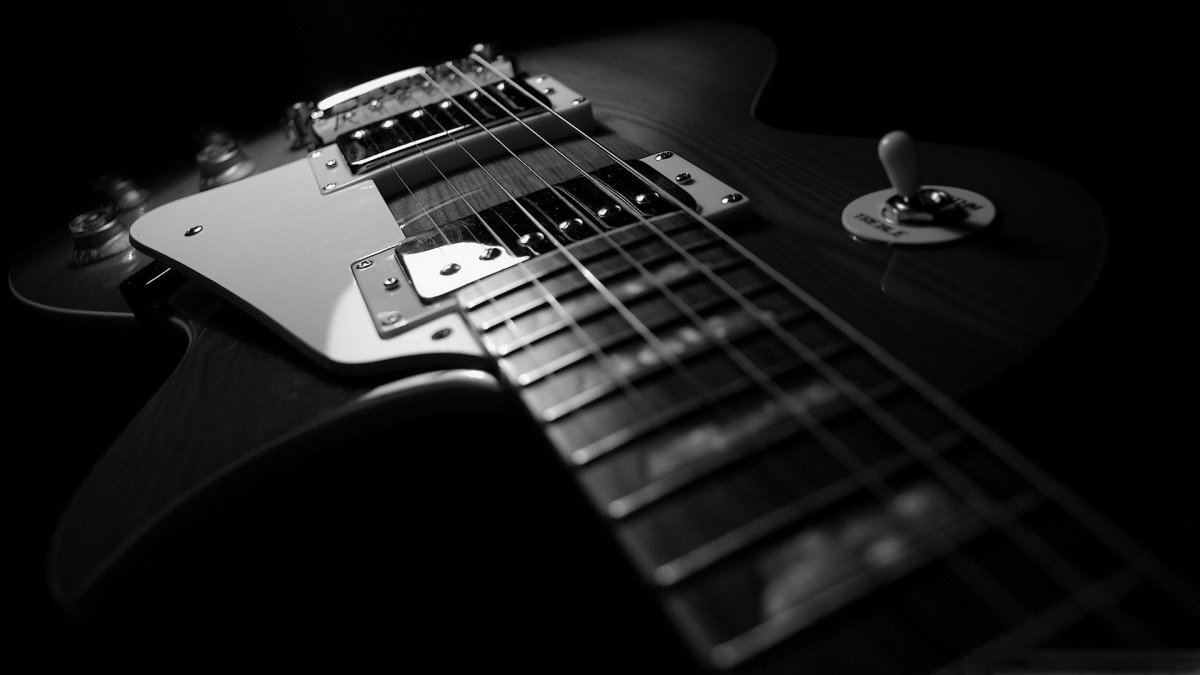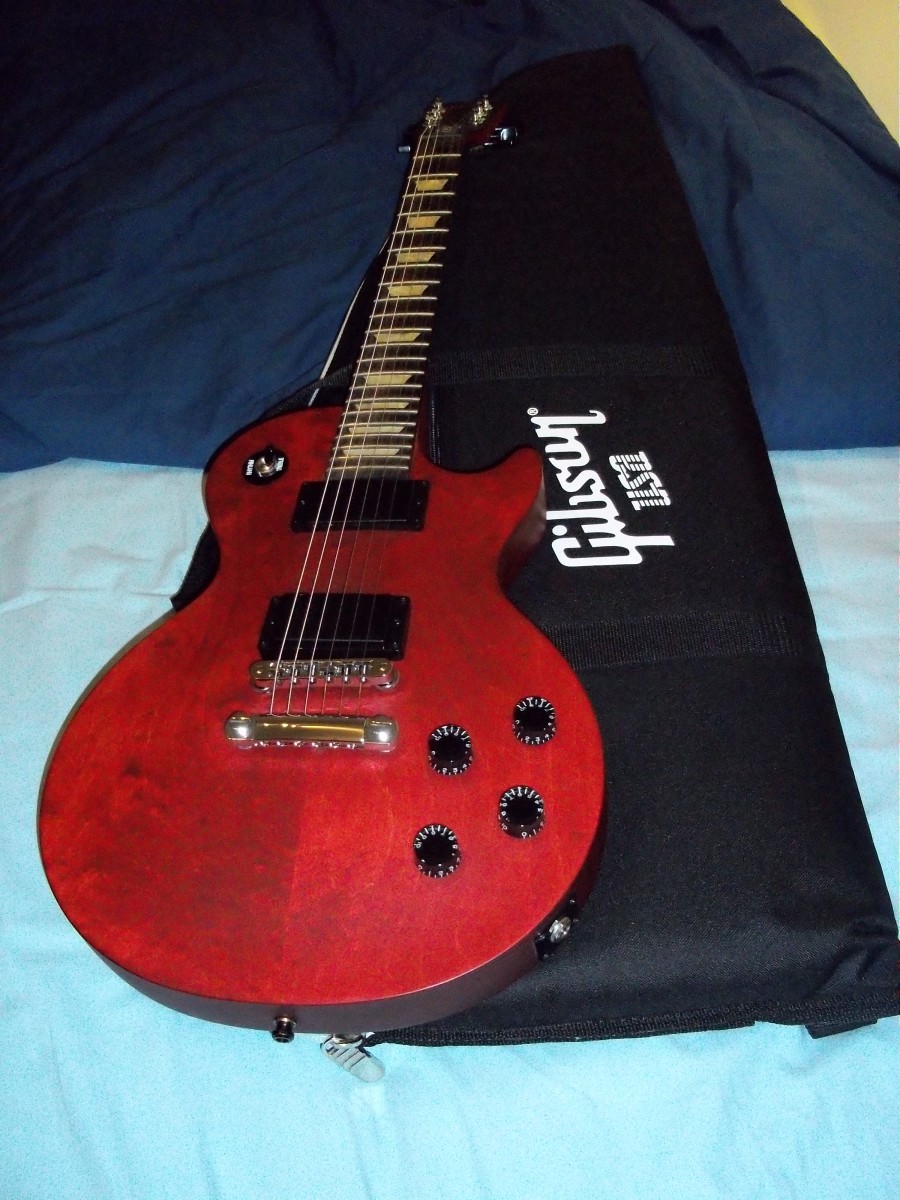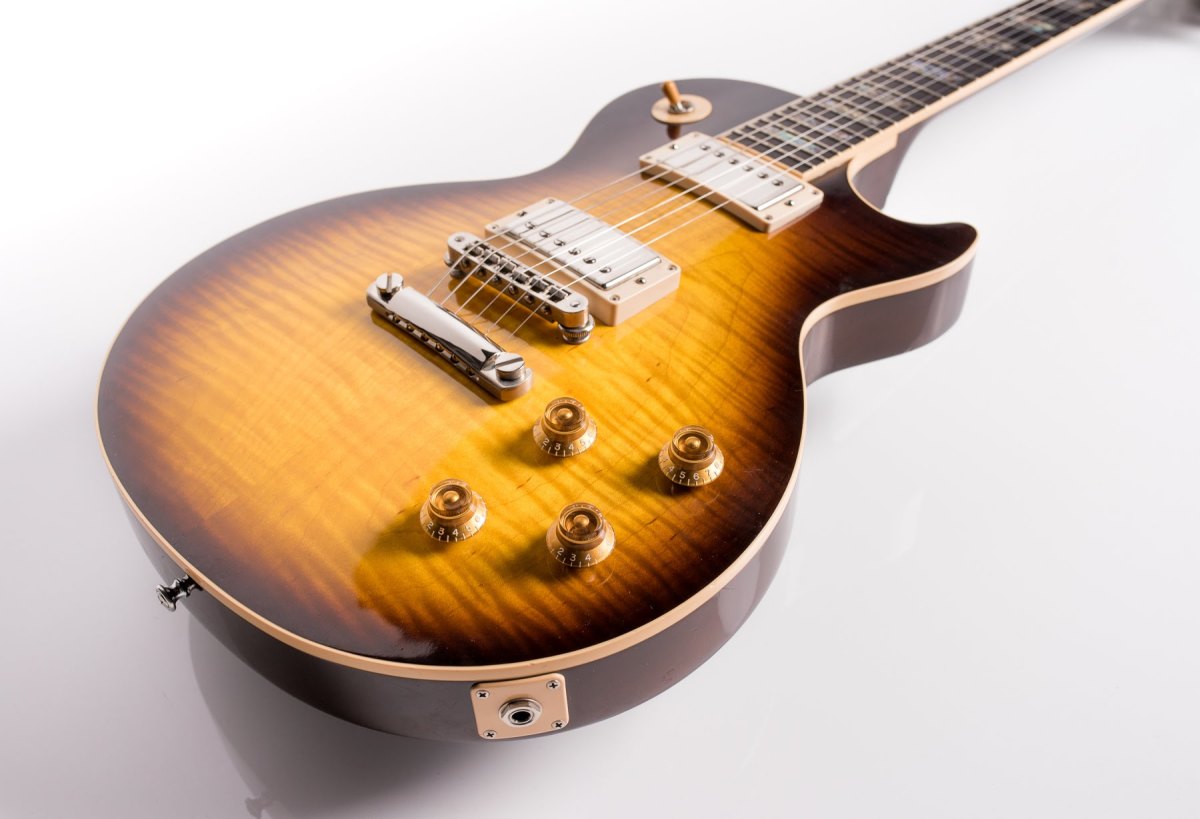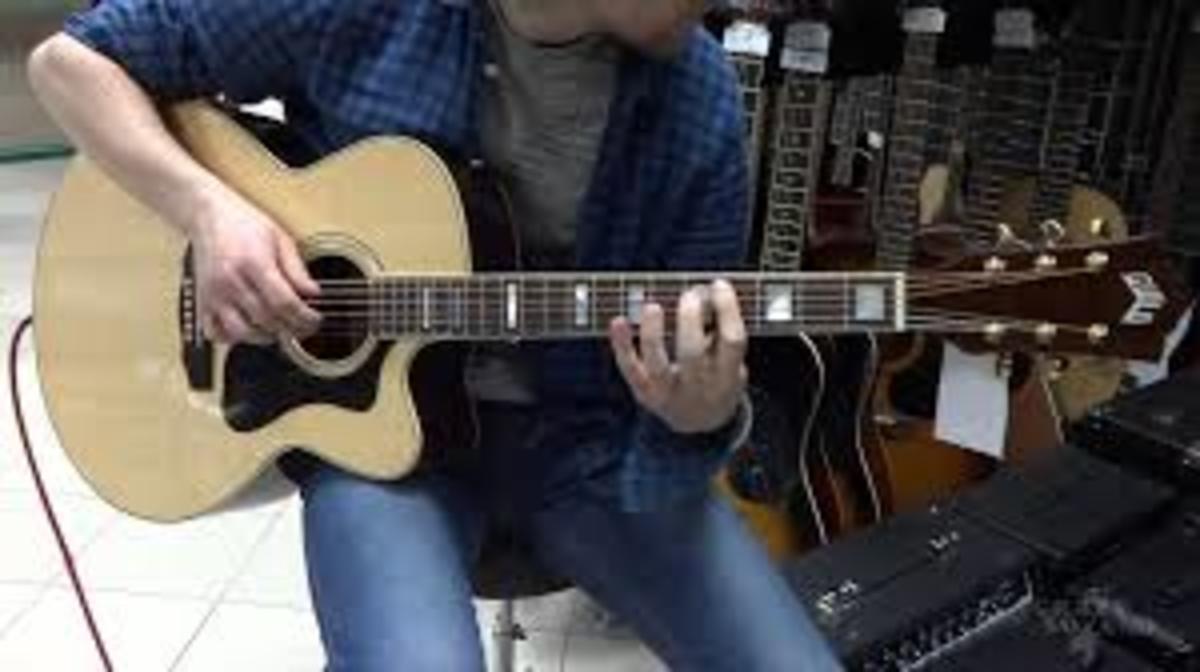How To Buy A Great Guitar - Tips For The First Time Buyer
Buying A Guitar
It's one of the paradoxes of life that we rarely have the experience we need at the moment we need it most. And that applies especially to any beginner who wants to learn how to play the guitar and is faced with the problem of buying an instrument.
You don't know what kind of guitar you want, whether you should buy new or second hand, and you don't know what faults and problems to look out for. So what do you do?
Guitar Shopping
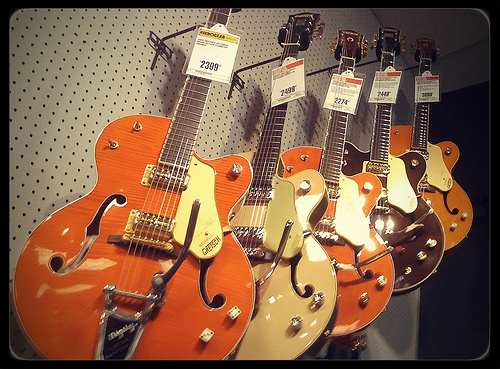
Acoustic Guitar Or Electric Guitar?
First ask yourself this: What kind of music do you want to play? The answer to this question pretty much chooses the type of guitar you need.
Classical guitar? Nylon strung Spanish guitar.
Folk music? Steel string acoustic guitar.
Blues, Rock, Metal? Solid body electric guitar.
Jazz? Hollow body electric guitar.
Still not sure? Listen to some more music, and ask guitar playing friends if you can try their instrument. Ask their advice - but don't feel duty bound to accept it. You're the one who has to live with the choice you make.
One way to decide is to think of your favourite guitarists, people who play the kind of music you'd like to play. What kind of guitar do they play? If they're all the same type of guitar, that's your most likely choice.
Buy The Best Guitar You Can Afford
Going guitar shopping? First time? Find someone more experienced than you and get them to help you buy your first guitar. Or at the very least try a lot of different instruments yourself and make sure the one you buy is -
a) Fit for purpose. Don't get a Spanish guitar with nylon strings if you plan on learning to shred speed metal riffs.
b) Of good quality. Always buy the best instrument you can afford. Have a budget, stick to it, and pick an instrument in your price range that is solidly built and in good condition. Nothing is more disheartening than trying to learn how to play on a poor instrument. You get what you pay for, and money spent on quality is rarely wasted. Well-built guitars, made from tonewoods instead of laminates, retain their resale value, and also produce a better sound that improves over time.
There are many well known brands: Fender, Gibson, Ibanez, Gretsch, Rickenbacker, Yamaha - the list is long. Buying a guitar made by one of the big manufacturers has the advantage that replacement parts are easily available.
Only you know how much you can afford to pay, so set your budget accordingly. But remember, it's just a guitar - which is to say you're buying a chunk of wood which produces pleasant musical sounds in the hands of a skilled player. Should you go into serious debt? Be realistic. Set a budget. Stick to it.
Guitar Heaven

Guitar Buying - What To Look Out For
If you're checking out an acoustic guitar, try fretting notes all over the neck and make sure they sound clearly, with no fret buzz. Sound the twelfth fret harmonic and fretted note on each string - they should be exactly the same pitch, or the guitar needs adjusting for intonation.
If it's an electric guitar, do the same, then run it through an amp - preferably something like the one you intend to use at home. Make sure all the pick ups, switches, and pots work, with no crackling or cutting out when you work any switches or volume/ tone knobs. Make sure the guitar is mechanically sound, with working tuners and tremolo, if it has one. Does it stay in tune when you use the tremolo arm? Make sure the construction is sound.
Check that the neck is firmly attached. Look down it from the headstock end. Is it straight? There should be a very slight downward curve, or relief, between nut and body. Does the guitar neck have a truss rod, with easy access for a hex key to adjust the neck relief?
If you're buying second hand, check the neck to make sure it's never been damaged. If you see signs of neck repair, don't buy that guitar. Check the frets and the fretboard. Signs of wear there? That's a repair job, and more expense down the line. Second hand guitars can be a beautiful bargain or a nightmare. Make sure you're not buying someone else's wear and tear.
Choosing the Guitar that's Right for You
Guitar Body Types
Electric guitars are usually made of hard woods like maple, alder, ash, or mahogany.
Solid body guitars can be constructed from a solid hunk of wood, routed and shaped, or several pieces glued together and topped with a veneer. Four of the most popular types of solid body electric guitars are the Fender Stratocaster and Fender Telecaster, and the Gibson Les Paul and Gibson SG. These instantly recognizable classic body shapes are also made by other manufacturers.
Acoustic guitars are made from thin sheets of tone woods, braced by cross members inside for strength and structural rigidity. Luthiers use hard tonewoods such as mahogany, rosewood and maple for backs and sides, and soft tonewoods like Sitka spruce for tops. Generally speaking, it's worth spending more on an acoustic than on an electric guitar, given that its tone depends entirely on its construction and materials, rather than on any outside amplification.
Steve Ouimette: Tips On Buying A Guitar
Guitar Bridge And Scale Length
Most guitars have a stoptail, or hard tail bridge for stable tuning, though some have a tremolo bridge. If the guitar you like has a tremolo arm, or whammy bar as they are sometimes known, check that it stays in tune when you use the tremolo.
(Incidentally, they should really be called vibrato arms. And vibrato units should really be called tremolo... you know what, forget it. This stuff is too complicated.)
The length of the fretboard, or scale length, can vary between different guitars, which has an effect both on playability and tone. The shorter scale length favours the player with smaller hands, while the longer scale favours longer fingers and hand-span.
When it comes to tone, a longer scale such as the Fender Telecaster's 251/2 inch scale length emphasizes 'brightness' or cleaner overtones and more separated harmonics, while the 24 3/4 inches scale length of a Gibson Les Paul highlights 'warmth', and more muddy overtones.
Most electric guitar necks have 22 frets, but if you want to play a full two fretted octaves per string you'll need to buy a guitar with a 24-fret neck. Note that most acoustic guitars only have easy access up to the 12th or 14th fret, where the neck joins the body, unless the body has a cutaway.
Guitar Necks
The neck to body joint comes in several flavours, each having different advantages:
Set-In: Neck glued to the body with a dovetail joint, to give better sustain. Gibson Les Paul guitars have set-in necks.
Bolt-On: Neck attached with bolts. The Fender Stratocaster and many other solid body guitars have bolt-on necks. If the neck gets broken or worn, it's a simple matter to slot in a new one.
Neck-Through-Body: Neck runs the length of the body, as in a lot of solid body guitars. This probably helps sustain, as no energy is lost between neck and body when the strings are struck.
A neck's profile can be described by its shape:
C: Rounded C shape.
Oval: Rounder than a C, but with a less pronounced curve.
U: Almost rectangular and good for players with long fingers.
V: Like a V in section.
Try a variety of neck profiles to see which fits your fretting hand best. The strings should fall easily under your fingers, and the size of the neck should allow your hand to firmly fret the notes. That should be your only consideration when taking the neck profile into account - is it comfortable to play?
Guitars!
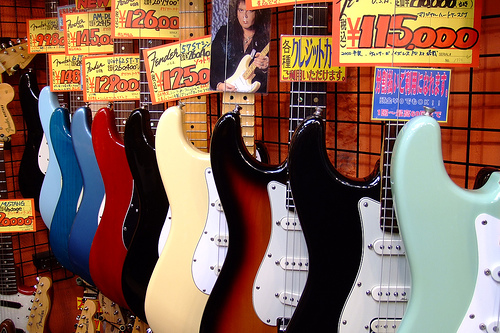
Guitar Pickups
Most electric guitars have two pickups, but some have three or more. They're generally arranged so one pickup sits close to the bridge and the other closer to the neck. As a result, the neck pick up has a softer tone, and the bridge pick up a harder tone. (Try plucking an unamplified guitar string at varying distances from the bridge - hear the change in tone?)
Pick ups come in two basic varieties, the single coil and the humbucker. The single-coil pickup may experience some interference, from mains hum. The humbucker eliminates most of the mains hum through using a design of stacked single coils. There are a number of different pickup types... which only adds to the confusion facing a first time buyer. You can get lost in a morass of expert opinion about different thicknesses of copper wire, various types of magnet, circuit design... it's the weird beard end of guitar making, and it can get complicated. Start down this path and you'll end up baffled and paralysed by over analysis.
The answer? Trust your ears, to cut through the crap. If you find an electric guitar with pickups that sound right, go with your gut.
Buy The Guitar That's Right For You
Never be in a hurry when it comes to a major purchase like buying a guitar. If you're not sure which model you want, after trying several, sleep on it. Take your time. While there may be several factors to take into consideration - price, playability, fitness for purpose - only you can make the decision involved.
Remember that if you're buying an electric guitar, you should budget for an amplifier as well. Effects pedals are another consideration, but if you're just starting to play, you can leave those until you've made some progress.
Guitars, like humans, come in various shapes and sizes. Children or other small people may find a 3/4-size guitar a better fit than a full-size instrument. If you're a bit on the frail side, you might not want to stand playing one of the heavier hard wood solid bodies for hours on end. Size and weight are points to consider when choosing your guitar.
A second hand guitar can be a good choice, but as with anything previously owned, make sure there are no issues with damage or repair. Unless you want to get into being a luthier, buying a guitar with problems is usually a mistake. If you do have luthier skills, buying a less than perfect high end guitar in order to repair it and sell it on can be a good way to make a profit, if you know what you're doing.
If you do choose to buy second hand, look in your local paper's for sale section rather than going to a music shop. Someone who bought a good guitar and gave up on it is your best bet - they might be happy to get it off their hands for half what they paid. Result? You get a nearly new quality instrument for the price of a low end one. If you go to a music shop to buy second hand, they know the value of their stock and you'll pay more.
Guitar Pedals
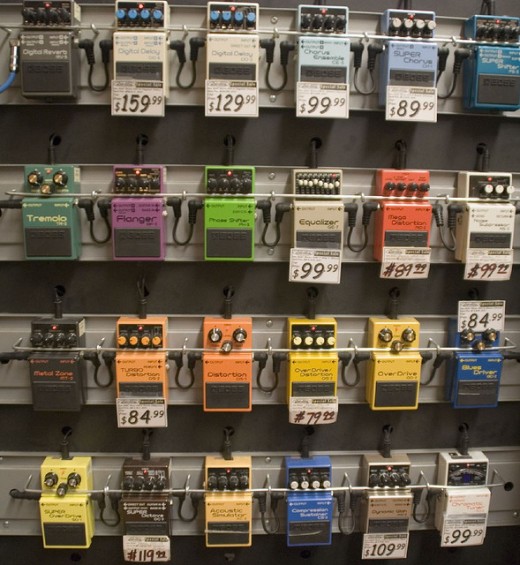
Play The Guitar
Finally, play the guitar you're thinking of buying. Does it feel right? This is perhaps the most important point to consider. You'll be spending a lot of hours on your instrument. It's a little like a marriage - if it doesn't feel okay from the start, it's probably not going to get any better. Sometimes you can go into a store with a definite instrument in mind, only to find it doesn't feel right under your hands. There are a lot of variables - does it fit your body size, your hand size? Would you be better off with a different shaped neck profile? Do you like the sound the guitar makes?
Take your time. Find a guitar you like, that you want to play. Or you'll be the one who ends up selling it at a loss in the local paper three months down the line.
This is one time your opinion counts more than any other, whether you're being pressured by salesmen, friends, or know-it-all strangers. And forming that opinion may take a long time, and involve trying a lot of different guitars. It's worth it in the end. Take your time, and get the guitar that's right for you.
DIY - Should I Build My Own Guitar?
This has a strange appeal for me - strange because I'm not good with power tools, but I'm obsessed with that part of YouTube that's crammed with guitar making videos, where amateur and professional luthiers lovingly craft their pet projects to completion.
You can pick up a serious luthier education on YouTube, and if you have the necessary skills and woodworking tools it's an avenue to consider. Why buy a guitar when you can build your perfect instrument? There are many suppliers online from whom you can buy wood blanks, ready made necks, fret wire, all the material and tools you need to build your own guitar.
It can be as simple as buying a bunch of ready made components - body, neck, pick ups and electrics - and knocking them together. Or as complicated as buying the wood and crafting your guitar from scratch. Whichever way you choose, you end up with exactly the guitar you want, at a lower price than you'd have had to pay to buy it ready made. (Except when you take the man hours, tools and materials into account.)
Do you have the skills? Check out the videos and the links and decide if this is the route for you.
Build a Guitar, Part 1, Neck
Must-have Guitar Accessories
Most of the guitar stuff you really don't need. But these things you do:
Guitar Case: Get a good hard case. They can be expensive, but that's still cheaper than seeing your guitar get damaged because you had nowhere safe to store it.
Strings: Buy a couple of spare sets, because strings break and wear out. Also, get some -
Cotton Dusters: To wipe down your strings and your guitar body every time you use it.
Picks, or plectrums: Keep a few handy. Try different sizes and thicknesses to find the shape that suits you.
Tuner: You'll need to tune your guitar. An electronic tuner makes this simple and easy.
Strap: Get a strap so you can play standing up. Pick something broad so it doesn't dig into your shoulder.
Cables: Electric guitar? Get some good quality cables to connect it to your amp. You'll need more, short cables if and when you add effects pedals into the chain.
Guitar Stand: Saves you propping your guitar in the corner of the room. And, most important of all...
Tuition: Learn how to play about a hundred times faster than working things out for yourself by buying tuition, whether you pay for lessons, books, or DVDs. And check out YouTube - there's literally hours of free online guitar tuition on there.
Kit Telecaster Build Part 1
This Is My Guitar. Shut Up And Take My Money.
So you found the guitar you love. It's perfect for you. You want to marry that guitar and make babies with it.
So now you take out your wallet, throw it at the salesman, and shout, 'Shut up and take my money,' right?
No. You hum and haw a little. You allow as how you might like this guitar a little better than some of the many others you've tried in various guitar shops this fine day. Then you might slip in a question about what a theoretical customer could expect to get thrown into the bargain if he or she should happen to choose to purchase this particular guitar.
Hard case, maybe? How about a strap too, and a couple of leads, spare sets of strings, cleaning kit...
They want to sell it to you. They have a margin, the difference between the trade price - the one they paid - and the asking price - the one they'd like you to pay - which allows you to knock them down a little or get them to throw in some useful ancillary guitar stuff.
You have to be the best judge of how hard to bargain. Check the body language of the salesman. Is he rolling on the floor laughing? Best not push too hard for a discount. Is he humming and hawing? Probe a little, test the waters. It's all a little bit touchy-feely, and will change from place to place and day to day, but if you get an agreeable assistant on a slow sales day, you might end up with a bargain.
How To Buy A Guitar - The Checklist
To sum up:
Decide what kind of guitar you want.
Have a budget in mind. Stick to it.
Be prepared to shop around.
Clueless? Take an informed friend.
Got skills? Consider making your guitar.
Try many instruments, hands on.
Narrow your choices down to a short list.
Found your guitar? Check for faults.
Sleep on your choice.
Try to drive a bargain.
And that should see you get the guitar of your dreams. Remember, you, and you alone, are the person who has to be happy with your choice. You could be playing your guitar for many years - it's as well to make sure you have the guitar you really want. Take your time, look at lots of guitars, sleep on it - and pick the right guitar for you.
Get A Guitar On Amazon
Guitar Links On The Net:
- Guitar - Wikipedia, the free encyclopedia
History of the instrument. - Vibrato or Tremolo?
I get a headache just thinking about this. - The Gear Page - Powered by vBulletin
This is a discussion forum about music, music gear - Free guitar lessons : Complete Beginners Method and loads of Blues, Jazz and rock : Learn how to pla
Completely free guitar lessons from Justin Sandercoe. A huge range of video, audio and text lessons on many topics including a complete beginners course, blues, jazz, rock, techniques and equipment. Payment by voluntary donation only :) all free. no - HowToBuyAGuitar
Free PDF download from Gibson guitars.



